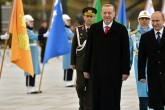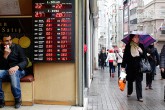Revolutionary riots, which had the potential to change the regimes of the countries in which they broke out, and the regional order are far away today from the purposes of their origin and their intended targets. Currently, it may be said that unintentional implications have occurred in all of the countries that experienced riots – except Tunisia.
Although the process still continues, the revolutions in the Middle East have not been materialized; however, nothing remained the same either. In this regard, changes at two levels may be brought to attention. The first is that the emergence of new alliances and counter-alliances among states at international level; and the other is the emergence of sub-state political entities as actors and their becoming part of these alliances.
Today, it is the case that Turkey-Ikhwan (The Muslim Brotherhood) or Qatar-Ikhwan relations, Turkey-Egypt or Egypt-Qatar relations are being discussed in Turkey. Similarly, it is impossible to analyze Egypt-Saudi Arabia relations without considering the political positions of Ikhwan or Salafi groups. The main reason shaping this picture is the counter-theses between pro-change actors and pro-status quo supporters although how a change will take place is the subject of another discussion.
PROBLEMATIZING TURKEY
Discursive criticisms targeting Turkey since day one of the uprisings in the Middle East may be categorized under three headings: Discourses claiming that Turkey acts ideological, the discourse of “precious loneliness” and the irrationality discourse.
The groups raising the first claim concentrate on that Turkey is acting upon Sunni reflexes and trying to form a Sunni line. Such a discourse, in particular, was adopted during the period in which the demand of change in Syria evolved into a civil war and Western actors’ policy in Syria had changed dramatically. While Turkey overtly voiced the legitimacy of peoples’ demands, , the countries going through a period of change had not developed a strategy based on different identity constituents and the insurgency had not yet begun in Syria.
The discourse of “precious loneliness” has been voiced from the time Turkey has differed from Iran and the Western actors on the Syrian question. Even itemizing the number of visits paid by top level officials to Turkey would be adequate to invalidate this discourse.
The third discourse is built around theses asserting that Turkey aims to bite off more than it can chew. Although this discourse serves itself on a rational ground, it misses that Turkey has been on the same page with the Western actors since the beginning of the period of change and that the Western actors, starting with the U.S., have been experiencing a political shift. Notwithstanding this, Turkey’s success in managing the risks involving the process has kept the country out of hot encounters and carried it into a central position to overcome the regional chaos.
FLEXIBLE FOREIGN POLICY
The main challenge Turkish foreign policy has faced during this process has been to develop a flexible strategy in accordance with the parameters of this period of change. Geographical distance and absence of emotional attachment to the issue make it easier for the Western actors to deal with the problem. Turkey, however, has neither such an open maneuvering space nor the luxury of having the minimal engagement in the issue since she sits right in the middle of the crisis.
An additional challenge is the ground of Turkey’s holistic approach in her Middle East policy has shifted in the last decade. The regional fragmentation necessitates the assessment of all micro issues individually. It seems impossible to adopt a holistic political approach at the regional level until the parameters of a new order are shaped. Therefore, the strategy that is developed in this conjuncture should not be allowed to influence the upcoming period.
[Sa
In this article
- Foreign Policy
- Opinion
- Arabian peninsula
- Civil War
- Egypt
- Global Actors | Local Actors
- Islamic Republic of Iran
- Middle East
- Muslim
- Qatar
- Saudi Arabia
- Sunni
- Syria
- Syrian Civil War
- Syrian Conflict
- Syrian Crisis
- Tunisia
- Turkish Foreign Policy
- Türkiye
- Türkiye-Egypt Relations
- Türkiye's Foreign Policy
- United States (US)
- Western World


